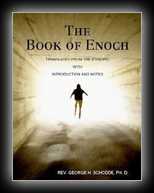
The Book of Enoch
by Rev. George H. Schodde, Ph.D.
1882
SCARCELY any department of theological science has, in the last few decades, received such marked attention and cultivation as that branch for which the Germans have adopted the felicitous appellation Neutestamentliche Zeitgeschichte, the study of the age of Christ in its political, social, and religious aspects. Observant readers will not have failed to detect that the tendency of modern evangelical theology is to transfer the centre of interest from the work of Christ to the person of Christ.
Hand in hand, and in close connection with this general tendency, certain auxiliary branches have assumed an importance hitherto not attributed to them. When the person of Christ forms the cynosure of all eyes, his surroundings proportionally grow in interest and importance; and hence it is not surprising that so much acumen and learning have been employed in the truly fascinating study of the Palestine of Christ’s day in all its relations. The central sun casts its rays of resplendent light on ever-day objects, and these become prominent in proportion as they reflect this light.
In more than one respect the Book of Enoch is an important factor in these investigations. Being one of the oldest specimens of apocalyptic literature; reflecting in its different parts the convictions, feelings, and longings of the people of God at different stages of their development; written in imitation of the spirit of the prophets, with religious purposes and spiritual objects; it can safely be said to be an invaluable aid to the understanding of the religious and moral atmosphere in which the Saviour lived. It does not belong merely to the curiosities of literature, but is a book of positive worth, and the source of much information to the patient investigator.
